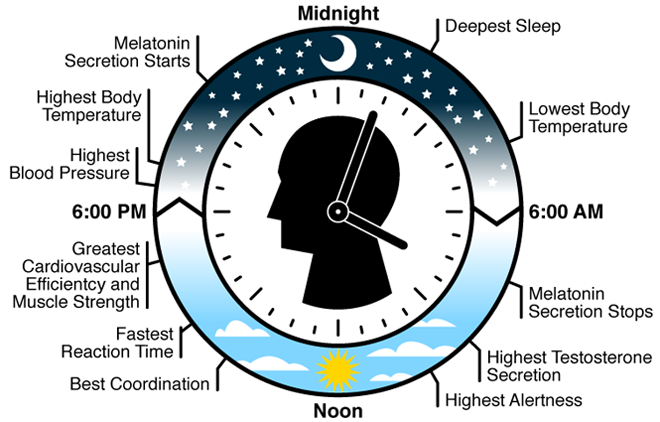1. Food Availability and Circadian Rhythms: Circadian clocks are synchronized to local time by sensitivity to environmental time cues (known as ‘zeitgebers’, in chrono-lingo). Light-dark cycles are a dominent zeitgeber for most species, but food intake also plays a critical role setting the phase of behavioral and physiological rhythms. A major part of our work is directed to understanding the brain mechanisms by which food synchronizes behavioral rhythms, enabling animals to anticipate regular daily mealtimes, and to remember the time and place of food availability.
2. Regulation of Circadian Rhythms by Behavioral State: Behavioral arousal induced during the usual sleep period can reset the circadian clock in at least some mammalian species, thereby shifting the daily sleep-wake cycle. We are conducting studies to identify the neural pathways and neurochemicals that mediate this effect of behavioral state on the circadian clock.
3. Mechanisms of Sleep and Consequences of Sleep Loss: Why we sleep remains controversial. Sleep loss impairs waking functions and has adverse effects on neural and physiological processes. We showed that sleep restriction in rats inhibits the production of new neurons in the hippocampus, a brain region critical for learning and memory. Current studies are investigating the mechanisms mediating this adverse consequence of sleep restriction.
4. Sleep Deprivation in Humans: Consequences and Countermeasures: Circadian regulation of behavioral state presents an ongoing challenge for people whose work entails night shifts or jet travel. The most significant consequences of circadian regulation under these conditions are impaired nighttime alertness and insufficient daytime sleep. We are currently evaluating light as a countermeasure for performance decrements in driving performance after a simulated nightshift.
A brief introduction to circadian rhythms research
Researchers have isolated a bundle of ~10,000 neurons as the brain's master pacemaker. The suprachiasmatic nucleus (SCN), which responds to light via specialized photoreceptors in the retina, has been determined to create circadian rhythmicity using intracellular gene regulatory networks that are present in individual SCN neurons (referred to as circadian clock cells). Each cell in the SCN independently oscillates as its own ~24hr timer, in conjunction with the master clock which acts as a conductor of sorts. These biological constructs have profound effects on how we view disease, cognition, behaviour, and much more. Photo: Wellcome Images
Circadian Rhythms and Psychology
Behavioral neuroscientists study circadian rhythms to understand the causes and consequences of temporal regulation at the molecular, systems, organismic and social levels of analysis. Circadian rhythms are relevant to the study of psychology in many ways. Photo: The Gladstone Institutes

